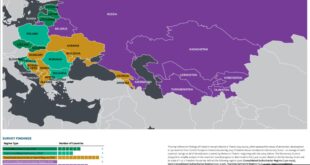Polling stations closed on Sunday evening across Kosovo in an election whose outcome remains hard to call owing to the tight competition between the main parties.
After 12 hours, polling station closed their doors at 7pm for voters to cast ballots in Kosovo’s early general elections.
The Central Election Commission said that 43.20 per cent of more than 1,700,000 eligible voters had cast ballots.
The highest turnout was registered in Pristina, where 51.73 per cent voted. Turnout was far lower in Serb-dominated areas. In North Mitrovica, 38.83 per cent voted, in Leposavic, 37.44 per cent cast ballots, in Zubin Potok, 41.02 per cent voted and in Zvecan only 27.36 voted.
No major irregularities were reported, but NGOs said their observers had witnessed thousands of cases of family voting and other cases of bribing voters.
The State Prosecutor’s Office said it was investigating several cases involving more than ten people who allegedly bribed voters in the Mitrovica and Lipjan regions.
Aiming to ensure that no corrupt acts or crimes took place during the voting, around 100 prosecutors were on duty across the country alongside 27,733 election observers.
The first preliminary results were due to be announced after midnight.
The early elections are considered to be crucial for the future integration of the Serbian northern part of the country, while the outcome will also be an important milestone on Kosovo’s European path.
The EU, which has been brokering talks on normalizing relations between Pristina and Belgrade, said it was looking forward to continuing its close ‘engagement and commitment to Kosovo with the new government after the elections’.
The outcome of the election is the most uncertain one ever since Kosovo declared independence in 2008.
Hashim Thaci, the outgoing Prime minister and leader of the Democratic Party of Kosovo, PDK, has ruled for more than six years, but his government is blamed for corruption, poverty and graft.
While casting his vote, Thaci said it was a “historic day” for the country. Thaci’s main challenge comes from Isa Mustafa’s Democratic League of Kosovo, LDK.
Meanwhile, the nationalistic Vetevendosje movement is expected to win more votes than it did in the last elections in 2010, when it gained 12.69 per cent.
While most of the parties praised the election process, the LDK announced it would not accept the results if there were major irregularities. Tracey Ann Jacobson, US ambassador, urged authorities to act responsibly during the count.
Some 30 parties with a total of 1,235 candidates ran for the June 8 polls.
In the last general elections in Kosovo held in 2010, the PDK won 32.11 per cent of the votes, the LDK won 24.69 per cent, Vetevendosje gained 12.69 per cent, Ramush Haradinaj’s Alliance for the Future of Kosovo, AAK, won 11.04 per cent and Behgjet Paccolli’s New Kosovo Alliance won 7.29 per cent.
 Eurasia Press & News
Eurasia Press & News



